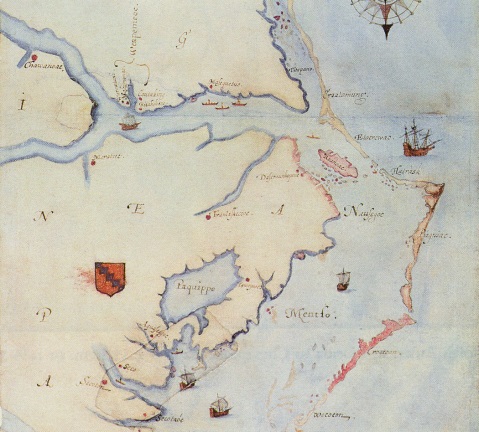
On April 27, 1584, Captains Arthur Barlowe and Philip Amadas sailed from the west coast of England in two ships “well furnished with men and victuals” to begin a four-month exploration of the New World.
The expedition was the first English exploration of Roanoke Island and was commissioned by Sir Walter Raleigh. The report which Barlowe produced on the expedition was written for Raleigh’s benefit.
After sailing through the Caribbean via the Canary Islands, the group arrived in present-day North Carolina in July 1584. First landing somewhere between Ocracoke Island and the Oregon Inlet, the party made their way to Roanoke Island in smaller boats.
The expedition developed friendly relationships with Native Americans through trade, gift exchanges and a mutual hospitality. The goodwill fostered between the groups led the Algonquian Indians Manteo and Wanchese to return to England with the group when they departed toward the end of the year.
The wealth of information provided by Amadas and Barlowe and the fascination with Manteo and Wanchese in England helped encourage Raleigh in his plans to colonize North America.
Barlowe’s report of the expedition describes the region and people in vivid, admiring detail. John White, a member of the mission who would be the governor of the ill-fated “Lost Colony,” added pictures of the Native Americans as well. A phrase describing North Carolina’s soil captures the spirit of the document well:
the most plentifull, sweete, fruitfull and wholesome of all the worlde.
The text was ultimately published in The Principall Navigations, Voiages, and Discoveries of the English Nation, by Richard Hakluyt, who used Barlowe’s admiring words to help encourage colonization.
Visit: Roanoke Island Festival Park and Fort Raleigh National Historic Site, both in Manteo, interpret this rich part of our state’s history.
Other related resources:
- The UNC-TV documentaryBirth of a Colony and its accompanying educational guide, both of which we were proud to produce
- Podcasts on North Carolina’s Exploration and Early Settlement from the N.C. Museum of History
Image from the British Museum.
